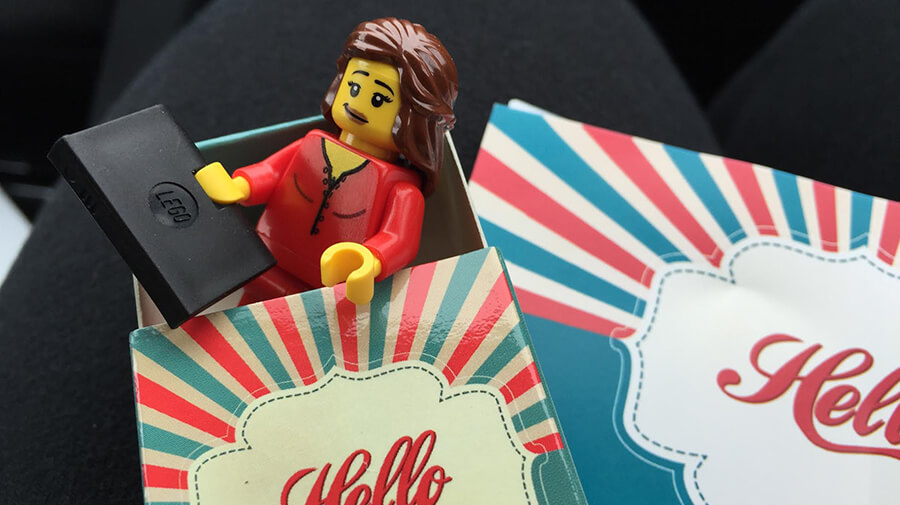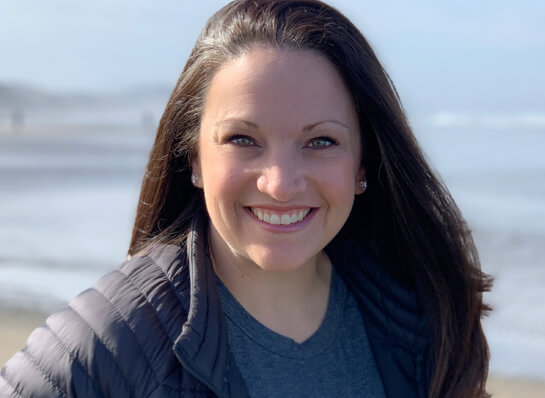Learn how to leverage follow up in your freelance business to build stronger relationships, close more sales, land more clients, and make more money.

Throughout college, I worked at a small ad agency as a production designer, gaining real-world experience. I also did internships. Completing one internship was a graduation requirement. I completed several alongside full-time enrollment and my regular job. If you know me, this isn’t surprising. I’m a first-born, people-pleasing overachiever who takes advantage of any opportunities that come my way.
I saw internships as a fantastic way to learn more about the graphic design industry, widen my skillset, and make me more valuable to a future employer.
In my senior year, while other students were scrambling to find the one internship they needed to graduate, I was finishing my fifth internship.
It worked like a charm, and just before graduation, I was offered two full-time positions. I stayed with the position I chose for two years until I quit without another job lined up. We had just bought a huge house with a huge mortgage and I couldn’t afford to not be working. The problem was that it was a down economy and there weren’t a lot of jobs to be had.
While several of my friends were still struggling to find that career position, I landed a new job in just over a week.
When I started freelancing, I knew I needed clients to survive. Without clients, I would have no income. Without income, our family would be in trouble. Most of the people I talked to at the time thought I was crazy to start my own business. Other freelancers warned me against it because they were struggling to make a living as a freelancer.
Those freelancers may have been living paycheck to paycheck on the feast or famine rollercoaster, but I hit six figures in revenue in my first full year of business.
I’ve never had an issue getting clients, earning the revenue I wanted, pivoting my business, or making things happen because I’ve never had an issue doing the hard and often uncomfortable work it required.
How Did You Do It?
For years, and even today, people ask me how I did it — How did you get that job? How did you get that opportunity? How did you get that client? How do you keep your pipeline full? How do you charge those rates? How did you get so lucky?
I’ve been asked it all.
Honestly, for years, I didn’t have a good answer. I just did it. Then I did it again and again.
I wasn’t sure what to say because there wasn’t a magic pill or sexy secret to share. I wasn’t doing anything different than what I thought everyone else was doing. And the more I sat with the questions I was asked, the more it became clear just how simple the answer was.
I wasn’t lucky. I created my own luck with hard work.
Everything I have accomplished today can be attributed to five things:
- Quality work: I always go all-in, do my best, and give my best. There’s a well-known phrase — your reputation precedes you — and I have always taken it to heart.
- Preparation: I set myself up to succeed and create my own luck through advance research, information gathering, and making initial connections.
- Showing Up: I was present, engaged, and visible. I’m sure you’ve heard someone say that 80% of life is just showing up — and it’s true! No one can offer you an opportunity if you’re not in the room.
- Relationships: I value people and want people to feel valued. People want to do business with people they know, like, and trust, so I help them get to know, like, and trust me.
- Following Up: I never leave things to chance and always follow up on everything no matter how big or small, because you never know where the next big opportunity, referral, or client will come from.
Of those five, personal, heartfelt, authentic follow-up has had the biggest impact:
- I relentlessly followed up on every internship lead I came across quickly and repeatedly until I got a yes or no.
- I followed up with potential employers, confirming their receipt of my resume, confirming an interview the day before, sending a thank you note after the interview, and inquiring if I didn’t hear back.
- When a vendor mentioned that if I was ever looking for alternative employment, I should give them a call, I sent a thank you note, stayed in touch, and called them the same day I decided to quit that job.
- When I started freelancing, I called every person I knew to ask for work, asked for introductions, and pounded the pavement visiting local businesses. I followed up with everyone and every single lead repeatedly until I was given a chance to prove myself or told to go away.
- After every event I attended, I wrote and mailed a handwritten note to every person I met that I could find a physical address for — and I always included something personal about our conversation or a shared experience.
Follow Up Creates Opportunities
Incredible opportunities don’t usually fall in your lap for no reason. Usually, they come from someone who knows you already, knows of you, or has been referred to you. That means you need to put yourself in the position to expand your network, build strong relationships, grow your personal brand, and become known.
No one can offer you an opportunity if they have no idea who you are.
Here’s how to make that happen:
- Make a list of three big opportunities you’d like to have, like getting the right internship, landing a new client, or speaking at an event.
- Do your homework and research everything. Where do the decision-makers hang out? Is it a networking group, a program, a group or club, a conference, a charity event, or maybe a non-profit board of directors?
- Go where they are and show up consistently. One time isn’t going to cut it. You need to show up, be yourself, build relationships, and give it time.
- Get involved. Join a committee, volunteer, contribute, help out, and step up. Do the work to be seen and be helpful, and leverage the know, like, trust factor.
Over time, these relationships will create opportunities. The idea isn’t to be fake or inauthentic or to only get involved for personal gain. It’s to ensure you are investing the limited time you have in the right places with the right people.
Many freelancers do the prep and show up but then drop the ball when it comes to real, personal, heartfelt, authentic follow-up. So few people remember to follow up that you’ll stand out from the crowd, gain respect, and be remembered. For me, consistent follow-up has led to invitations to speak at events, join podcasts and radio shows, co-host webinars, write guest blog posts, and host workshops. It’s also led to new clients and sales.
Follow up opportunities abound in business:
- After an event
- After a call, meeting, meal, conversation, or social media interaction
- Before, during, and after a sale
- After a referral
- After an opt-in
- And more
Post-Event Follow Up
After a networking event or conference, follow-up can open the door to significant opportunities, especially because most people forget are so busy playing catch-up from being out of the office that they forget to do any follow-up.
Most people send a simple follow-up email because it requires the least amount of effort. Unfortunately, it’s also the approach that gets ignored (or deleted) the most because we all already get too much email.
If you really want to stand out and get someone’s attention, send traditional snail mail. A personal handwritten note sent on high-quality, branded stationery or note cards speaks volumes, and people just really love getting mail — especially colorful, fun mail that doesn’t look like a bill. It makes them feel special and it sparks curiosity.
Or, you can take it a step further like Curtis McHale did after we discussed Legos at length during a conference. A few days after the event, he sent me a follow-up email and a quick shout-out via Twitter. A couple of weeks later, I received a custom Lego Mini Figure in the mail that looked just like me — she even had a laptop — along with a handwritten note. His personalized follow-up experience definitely made an impact.

Here are a few tips that make post-event follow up easier:
- If there is an attendee list posted, you or a member of your team can research mailing addresses for key people you want to connect with in advance
- Address and stamp the envelopes in advance to ensure that your follow up is prompt.
- Print high-quality, branded note cards and bring them with you to the event so you can write your thank you notes at the hotel or during the plane ride home.
- Make your follow-up personal. Take the time to get to know people and what they are into. After a meaningful conversation, take a moment to write down what you talked about so you can reference it in your follow-up.
Conversation And Interaction Follow Up
You can follow up with potential leads, prospective clients, and possible opportunities in several different ways like a phone call, a meeting, an email, and even social media messages:
- After A Phone Call: Follow up with a recap of the conversation, links to resources you mentioned, a connection or introduction to a person you mentioned, or the action steps from the call.
- After An Email: Follow up on any promises, suggestions, or action items discussed by email. Don’t let promises or opportunities that present themselves by email fall by the wayside because your inbox is too full.
- After A Meeting: Send meeting attendees a follow-up email with a meeting recap. If any action items were discussed, take care of them right away. Follow up by email with any promised information, introductions, or referrals.
- After A Social Media Interaction: This is a golden opportunity. If you see someone searching for a referral, information, advice, or help through social media, reach out! Let them know you can help, invite them to share their contact info with you, and follow up by email or phone. Be the person that goes the extra mile.
Follow Up Before, During, And After A Sale
Considering that 35-50% of sales go to the vendor that responds first, it’s obvious that follow up can make or break a freelancer’s success. What crazy is that while 80% of sales require five follow-up calls, a whopping 44% of salespeople give up after just one follow-up call.
The problem is that freelancers who are very good at what they do have an abundance of referrals and leads — and that makes them lazy about marketing and sales. What usually happens is that a proposal is crafted, it’s sent over to a potential client, and then because plates are already too full, a dangerous waiting game is played. Excuses like “I don’t want to bug them” or “I don’t want to be a nag” or “I don’t want to look desperate” are tossed about to justify a lack of follow up.
The thing is, freelancers who follow up throughout the entire sales process are the ones who win the contracts.
- After you send a proposal to a potential new client, follow up to confirm it was received.
- Follow up a few days later to see if they have questions.
- If a prospective client tells you they need to discuss your proposal with a team, board, committee, or other stakeholders, offer to be part of the discussion. Let them know you’re available to join the meeting.
- And continue to follow up consistently until you get a yes or a no.
This same pursuit must continue after the sale.
Never rely on an automated receipt. Get a solid new client onboarding system in place that reminds clients what a smart idea it was to hire you and eliminates any potential feelings of buyer’s remorse. Create an onboarding experience that communicates what to expect, how things are going to work, what they need to do, what’s happening next, and more.
Then once the project is complete, follow up with your clients at two weeks, six weeks, three months, and six months. Stay top of mind, show them you care, and offer additional services. It’s easier to get a referral from and sell more work to an existing happy client than it is to sell new work to a new client.
Follow Up After A Referral
Earning a referral can feel like winning the lottery. Not only did someone else give you their vote of confidence, but now you have a new lead!
If you want to grow a referral-based business, you have to take care of your referral sources. That means making sure they feel valued and appreciated. It also means creating an extraordinary client experience for those referred to you so your referral sources look good for making the referral.
- Thank your referral source right away when an introduction is made or a lead they referred to you reaches out.
- Keep your referral source apprised of the status of the referral and let them know when you close the sale or why the sale fell through.
- Alert them when the referred project wraps up and share how it went
- Send your referral source a thank you note, or depending on the size of the referral, a thank you gift.
Follow Up After An opt-In
When someone signs up for your newsletter or a free offer on your website, it’s a signal that they’re interested in what you have to say and offer. They are primed for additional information so don’t throw this opportunity in the garbage. Create and set up a welcome email or autoresponder that helps them get to know you, sets expectations, provides helpful bonus content, and more.
The Bottom Line On Follow Up
Luck is simply being ready and able to take advantage of an opportunity, yet opportunities don’t appear out of thin air. They are created through hard work, preparation, showing up (a lot), relationships, and relentless follow-up.
Don’t be lazy. Don’t just rely on email or a quick “great to see you” post to Twitter or Facebook. Yes, those approaches have value but you need to make your relationships matter, and nothing packs a punch like a handwritten note, a personal message, or a meaningful gift.
The bottom line is that YOU create your own luck.
You can get all of the clients you need, earn the revenue you want, pivot your business, and make things happen by doing the hard and often uncomfortable work it requires — following up and not giving up until it’s a yes or a no. By following up on every possibility, you open the doors to new opportunities and one of those may just change the trajectory of your entire business and your life.
This post is an updated version of Follow Up To Build Relationships and Create Opportunities.
